I’m writing you right now from underneath my brother Aarash (6), who is pretending to be a dog (of varying breeds) and is very disappointed that I won’t play along with him. He’s now discovered his own name in my writing and is attempting to read the rest, while positioning his entire body on top of my arm so that I can barely reach the keyboard. What he doesn’t realize is that, as the writer, I have all of the narrative leverage, and I can portray his actions however I choose. He’s attempting to ask me what I’m writing, but I’m ignoring him successfully (or so the writer would have you believe). Having realized that I’m not going to play, he’s now decided to play on his own and make both as big of a mess as he can and as much noise as possible. But I persevere.
Recently, I’ve really been feeling the inconsistency of my life here. One week, I can have plans nearly every day, and getting around the city is such a pain to begin with that it feels like I have barely any time to relax. Then, another week, I hardly take a step outside of my steadily trodden path to and from school, my afternoons stretching wide and leaving me, alone, to fill them. Rather than excited to not know what each day holds, it’s begun to feel frustrating, like I don’t have any say in how my day unfolds. Time opens and shuts, and I live at its whims.
After nine months here, I have been able to make some friends, but it hasn’t been easy or straightforward. Besides school, there are no places where I go very regularly, so the people I’ve met seem to randomly drop into my life, and we don’t necessarily have any shared interests or things in common. A lot of the young Nepalis that I’ve met seem to spend their free social time just sitting with friends by a temple and smoking a cigarette, an activity which holds no interest for me. Even when I do meet people who seem nice and want to be friends, I don’t really know what to do with them. The World Cup has been a clear point of interest and obvious shared activity—though its ties with Nepal are complicated and ongoing—but it’s only temporary. Once you go on a long walk or two or drink tea with someone a few times, you have to mix it up a little bit.
And the truth is that a lot of my attempts at making friends have failed, in ways that make me feel rather dispirited. One guy I met a while back hung out with me a few times, and then started asking me for money to help him out. I gave him a little bit, and he paid part of it back, but soon asked for more. Then, after a long break, he texted me to ask for help getting an American visa, and I told him the truth: that I’m just a normal citizen and can’t help. I never heard from him again after that. Since that experience, I’ve been a bit wary when people act friendly and ask about where I’m from. It’s unfortunate, because I don’t like feeling guarded, but I also don’t want to be friends with someone who’s only in it because they want something from me.
My host family has been some help with meeting people, but not as much as I wish they were. When I’m at home, my brothers love to spend time with me, so much so that I sometimes have to kick them out just to get a little alone time. But I feel disconnected from the larger community that my family is a part of—and in a society in which the family is one of the main social units, that is isolating. Part of it is a language barrier: my host family has steadily refused to teach me any Nepal Bhasa, the Newar language, since they are intent on me teaching them as much English as possible. The result is that when I do go with them to events, I am usually left out of the conversation almost completely.
More often than linguistic exclusion, however, I am left behind literally. I don’t know why: maybe my host family thinks that I don’t like going to parties, which could be true since I don’t speak any of their language. But it happens all the time, with no warning at all. I’ll suddenly realize that no one is in the house, and no one told me where the family went, only for them to return hours later wearing nice clothes and tell me they went to a bhoj (feast). Just this past Tuesday, my host mom called up to me in my room and told me that they were leaving to go to a party, but not to worry, she had already cooked me dinner, so what time should she be back to heat it up and serve me? I sighed and finally said, how about eight o’clock, the usual dinnertime. She said eight was a bit early, but she could be back by nine.
At the same time, my time outside of the house has been really enjoyable, spent with a combination of American and Nepali friends, finding ways to escape the city or enjoy little pockets of peace. Last week was the beginning of the winter season, which is celebrated in the Newar community with the making of yomari, special rice-flour steamed dumplings with sweet molasses-y or ricotta-like fillings. I walked around with a friend and we tried to find a place to make them ourselves, but in the end we settled for just eating them, which wasn’t a bad alternative at all. The very next day, a group of people came to my side of town for a dinner at a restaurant near my house famous for its Newar food, and I remembered the joy of meeting new people over a delicious meal (and, of course, more yomari).
I’ve also met up a couple of times with a Nepali friend I met while trekking, who has turned out to be relatively willing to let me join her in her daily life. We got some tea and then met up with another trekking friend one time, and she led us to a little local restaurant where we loaded up on a dozen fantastic little dishes for less than a dollar each and reminisced on our days in the mountains. Another day, I followed the same friend around while she went shopping for a wedding she was going to, and we chatted amongst the chaos of a massive bazaar in the middle of Kathmandu. Then she ducked into an alleyway and led me to the best samosas I’ve had in my life. In many ways, it’s just what I’ve been looking for: someone easy to spend time with, who wants or needs nothing more, and who can share a bit of their real life here with me.
My time at school is slowly drawing to a close as I enter my last month here, since our second term exams start next week and are followed by two weeks of vacation. After so long teaching here, the system has beaten me down and reduced me to a pure pragmatist: forget teaching my students any practical English, let’s at least see if I can prepare them for their exams, as terrible as they might be. But even when I put aside the non-linear textbook curriculum and the obscenely difficult reading passages, it’s still a massive challenge. These days, most of my classes are so far behind that I shamelessly feed students answers to questions from the textbook, just hoping to cover the material in time. But some students are absent so often that as hard as I try not to leave anyone behind, kids fall through the cracks.
There is always something new here about the educational system to make me feel frustrated, but this time what’s bothering me is a little bigger-picture. Because of a conglomeration of other factors that I’ve written about previously, students here aren’t taught to think for themselves in any real way, to try to actually understand things. It’s not that they want to take the easy way out—I’m convinced that they just don’t know any other way. When answering textbook questions about a reading, I have never seen a student compose their own original answer: instead, they look through the text for the sentence which most closely resembles an answer, and then copy that sentence directly. When they ask me to help, what they’re really asking is for me to point to the passage and show them which sentence to copy down in their notebook. As they get older, they get better at copying only the correct bits of the sentences, but not one of my students finds their own answers; not one of them reads the text, thinks about it, and writes an answer to the question from their own mind.
But I see another problem at my school, one maybe even bigger than the lack of independent thinking: the teachers seem at times to have very little respect for the students, and that really concerns me. When one of my co-teachers and I split up to give speaking tests to grade four and then met back up to share grades, I saw that where I had written students’ names by their grades, she had written their attendance roll numbers. While I say hello and hug my students arriving at school every morning, I’ve seen students greet teachers and have their namaste completely ignored. In the staff room the other day, a teacher was asking the last name of a student in grade two, and when I said that it must be the same as her older sister’s last name in grade five, all the teachers were astounded that I knew not only her last name but the fact that they were sisters, and they joked that I should be the principal.
I’m not saying that I’d do a bad job as our principal—I’d certainly have a better attendance record, at least—but I’m not sure that was my main takeaway from the interaction. I’ve seen teachers send students to go get stuff they’ve forgotten, whether it’s the whiteboard eraser or a spoon for their lunch, and, on one occasion, I even saw a teacher give a kid some money to go buy them a snack from the store across the street while they sat and chatted in the teachers’ room. And I know enough Nepali now to hear when a teacher is ordering students around with the tã form—the lowest-intimacy of the four Nepali second-person pronouns. While tã is not necessarily culturally inappropriate for a teacher to use with a student, it’s generally considered a rude pronoun in most contexts outside of direct family, and is certainly not a polite or respectful way to speak to anyone. Some differences are cultural, of course, but not all of them. It’s difficult for me to see my students, whom I love and have grown close to, treated so often by the teachers as if they are not important.
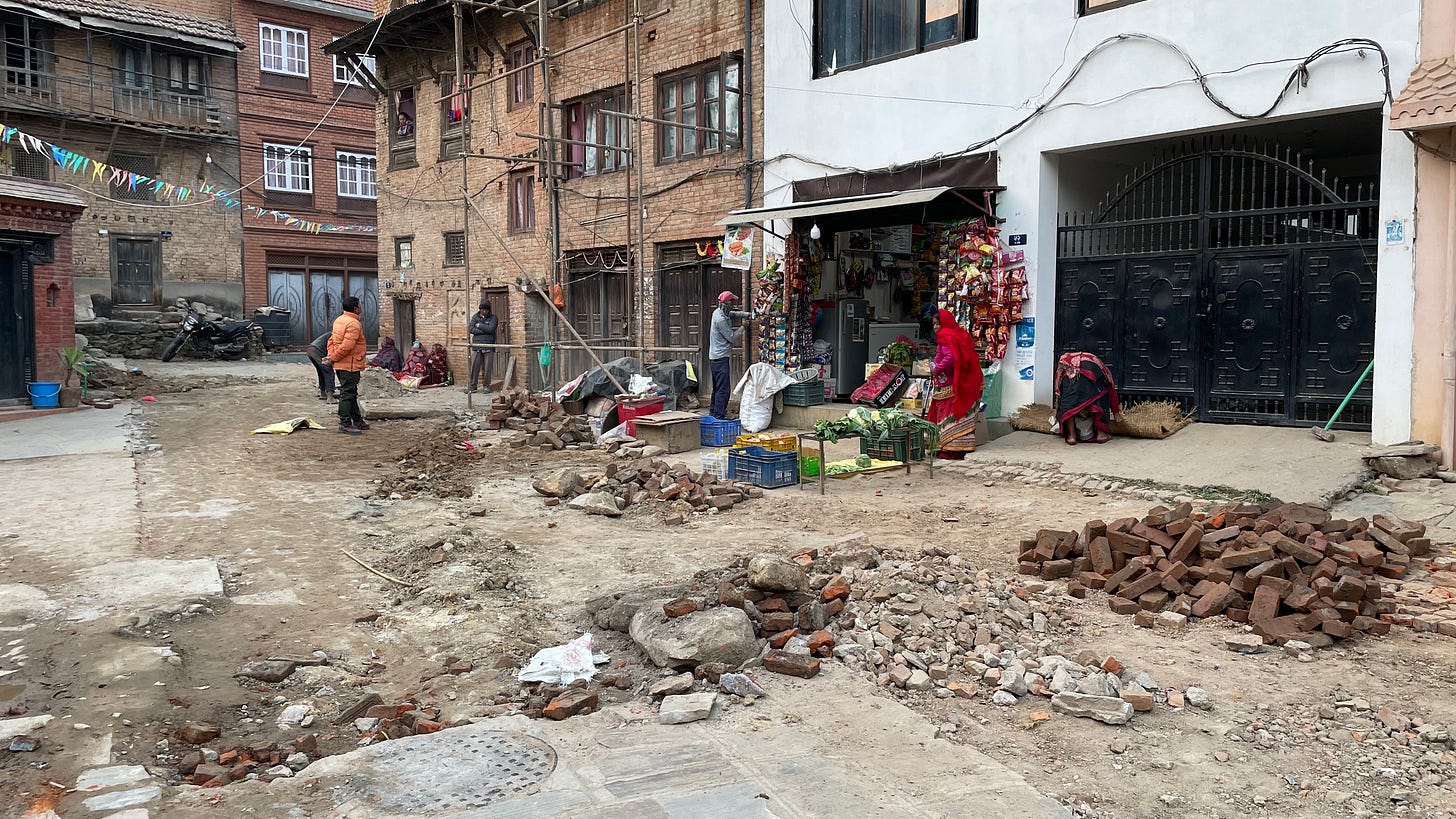
Perhaps, more than any amount of English, that is something that I can teach my students during my time here. As the end of my journey draws near, I have naturally begun reflecting a bit more on whether I accomplished my purpose (well, my stated purpose, anyway) of improving the English level at my school. And to be honest, maybe I am still among the trees, but from where I stand it doesn’t look like the forest has gotten too much better at speaking English.
And yes, my official title is “English Teaching Assistant,” but I still have the narrative power here, so I might venture to put forward a different perspective that will make me feel a bit better about myself (and it might even be true—or so the writer would have you believe): that teaching English, per se, was not actually the most important thing that I could have done for my students. Rather, in a system which ignores individuality, a system which often sees these kids as worthless, I have entered the classroom every day with kindness and put the students first, I have done my best to show them that they matter. And maybe that’s the best thing that I could give them after all. Though we’ll see how much it helps them on their exams next week.
Until next time: peace!
Much love,
Oren
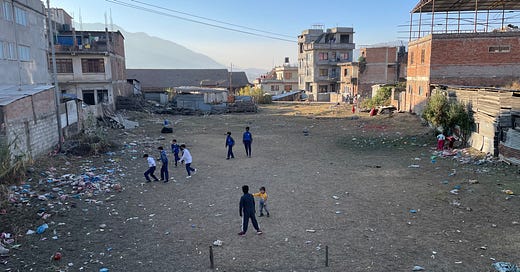




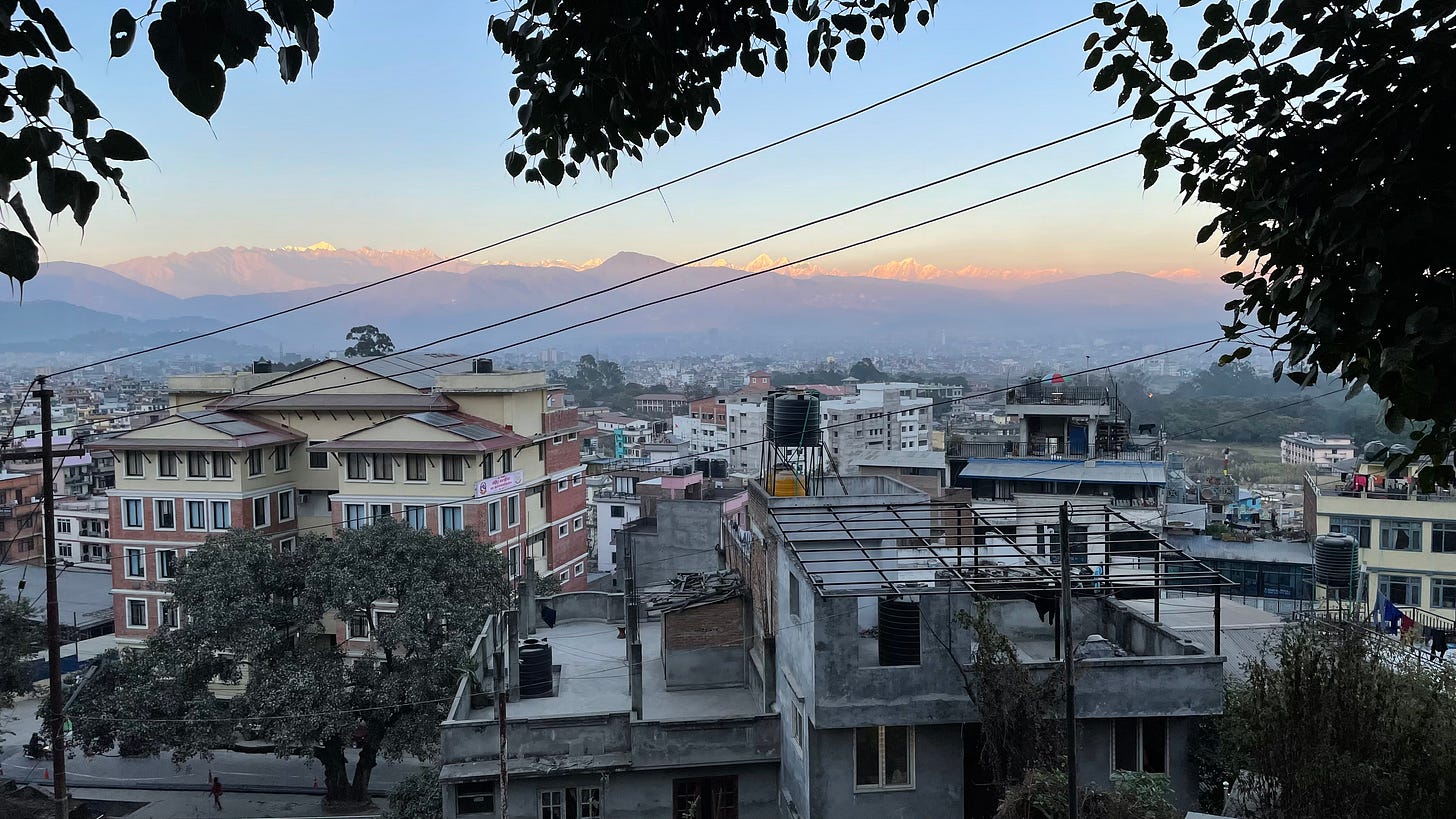
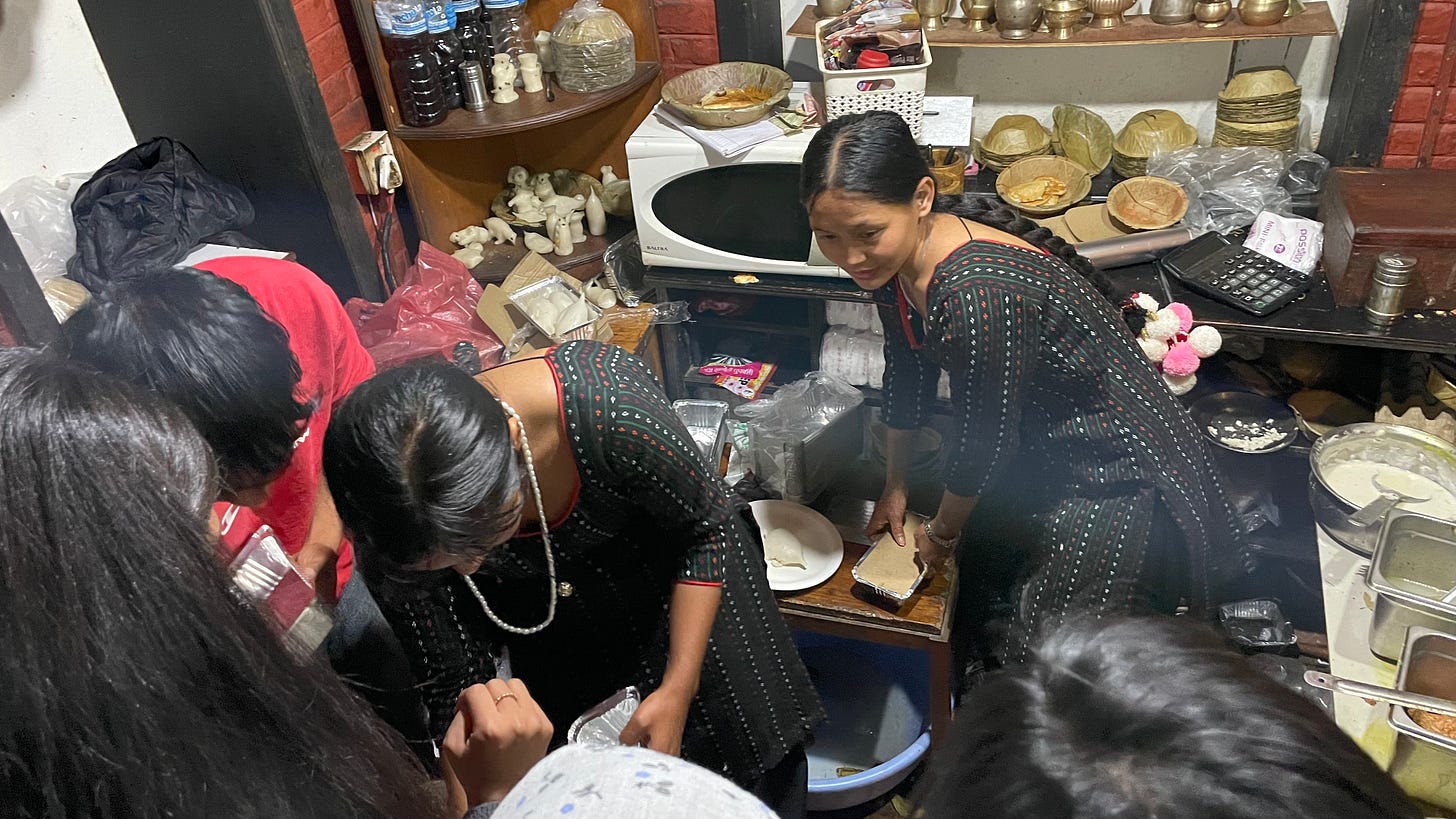

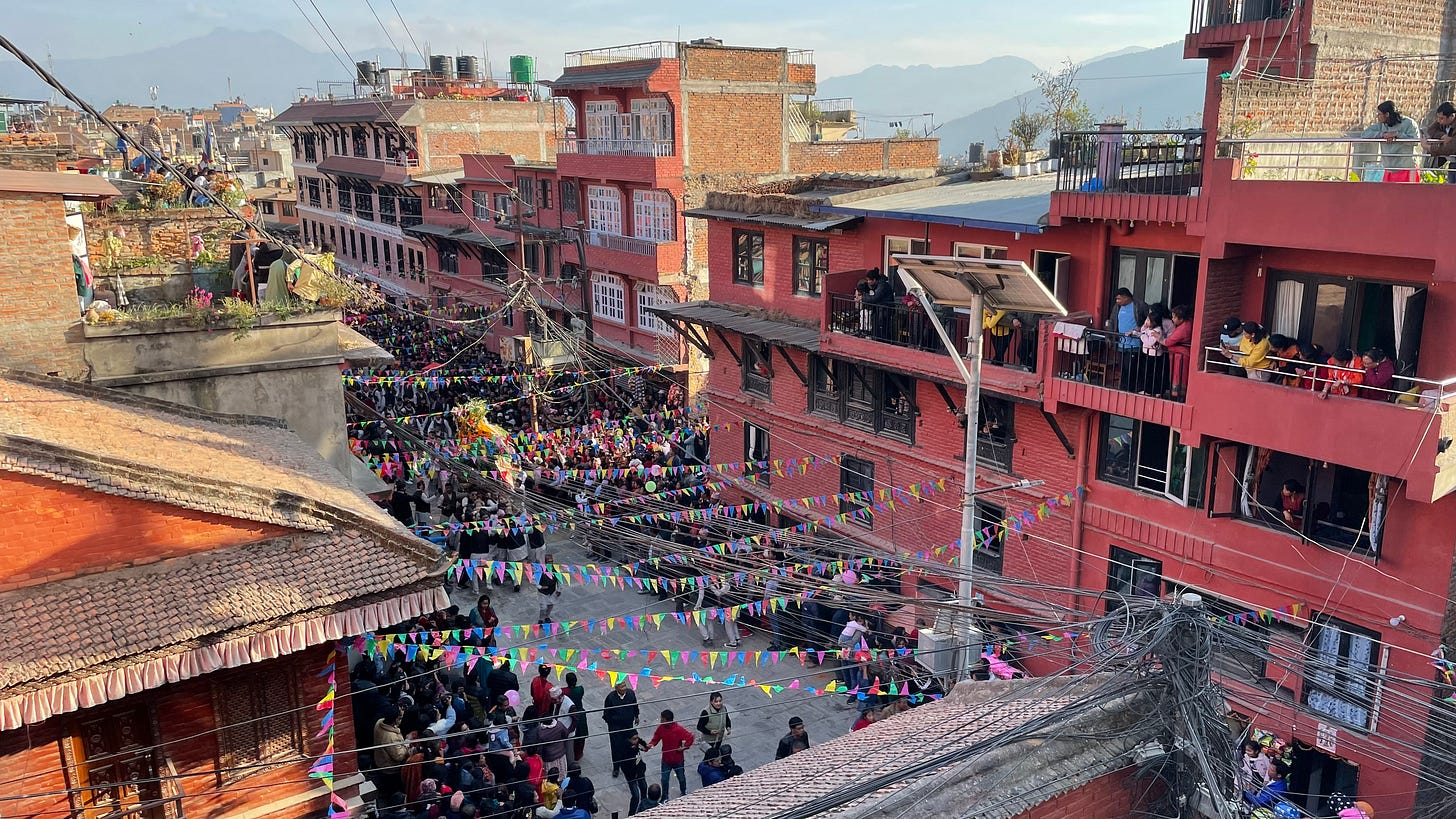
Amy’s right. You don’t feel the effect you have, but I’m sure you have made a difference. It’s so hard to understand cultural or pedagogical ways when they seem to be such a disservice to children. Sweet and Sour, that’s the theme for the year.
Good luck to your students next week, Oren! I'm sure you are making big difference in the lives of all these kids, especially your Nepali brothers!